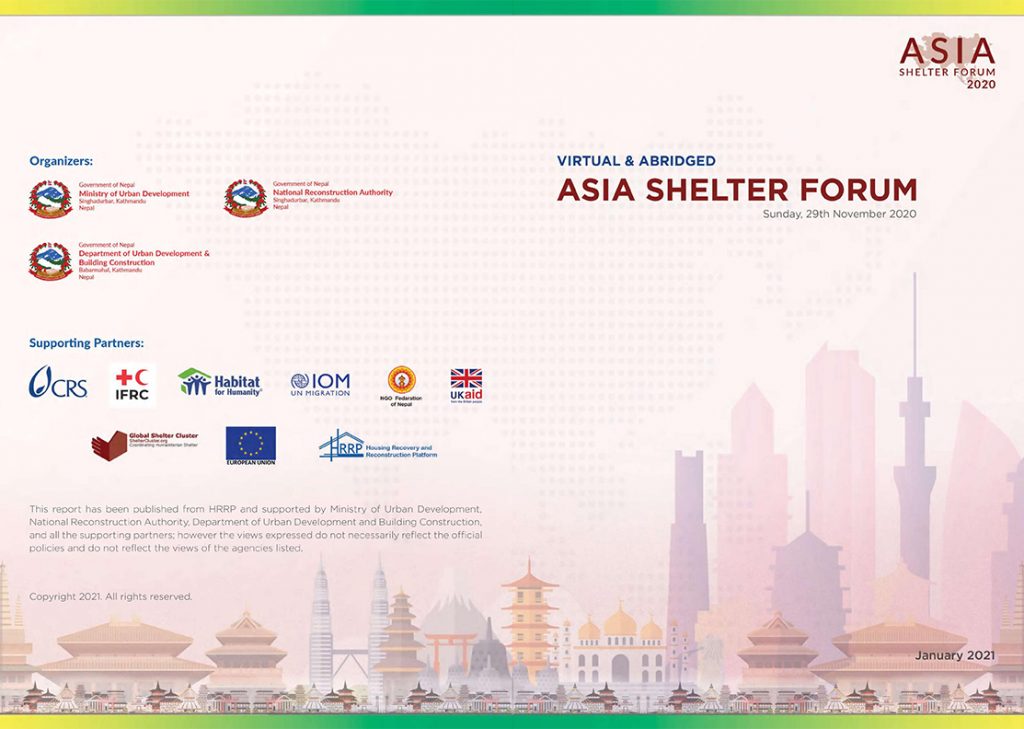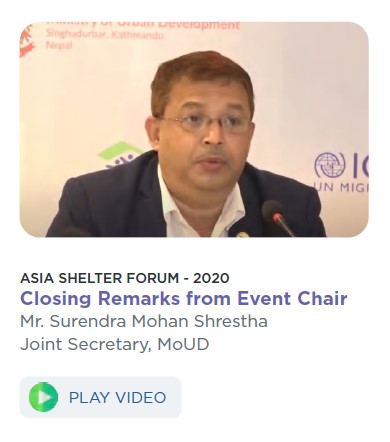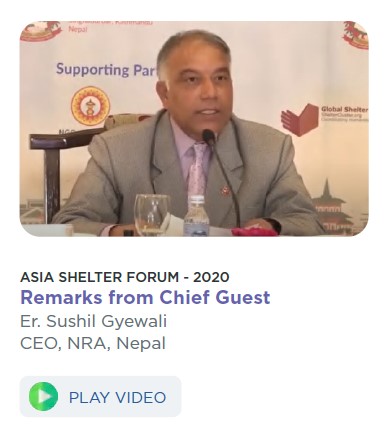Click in the link to access to the Full Report: https://bit.ly/3uQabv3
Author Archives: Asia Shelter Forum
Asia Shelter Forum 2020 Playlist
ASF 2020, Closing Remarks from Event Chair. Mr. Surendar Mohan Shrestha, Joint Secretary, MoUD
Mr. Surendra Mohan Shrestha offered a vote of thanks on behalf of the Minister, Mr. Krishna Gopal Shrestha, Ministry of Urban Development. He praised the beauty of this forum to discuss challenges and identify solutions for our communities. He also expressed his commitment to ensure continued support in such regional collaborations and highlighted that such networks are important for regional learning. ASF needs to foster all countries in Asia-Pacific region to enhance its partnership and collaborations. He stated that the technical support would be essential as Nepalis advancing towards building resilient communities and much of the work remains to be done in the housing recovery of vulnerable households, urban areas and retrofitting, to ensure that no one is left behind. He further reiterated that MoUD remains committed to contributing to remaining reconstruction, preparedness and regular development works and ASF could play an important role to enrich knowledge transfer to policy makers and practitioners as it continues to expand in the region with robust support systems to coordinate, share ideas and implement best practices at all levels from grassroots level to regional, national and global shelter cluster.
ASF 2020, Remarks from Chief Guest, Er. Sushil Gyewali, CEO, NRA
Mr. Gyewali appreciated the forum’s capacity to know about activities of ASF in networking and extending of learnings by various institutions working in shelter and related components. In the 2015 earthquake, 8790 people died, almost 22,300 were injured, there was damage to 800,000 houses, 10,000 schools, 1,200 health facilities, 415 govt buildings, 300 local governments, 1500 water supply schemes, and 2200 heritage monuments and monasteries. The Post Disaster Needs Assessment estimated an economic loss of 7.1 billion USD.
Five and a half years after the earthquake, the progress has been remarkable. Nepal has received huge support, locally and internationally. NRA has completed 80% of the private housing reconstruction. There were many challenges in the reconstruction process as the NRA was moving forward for instance the country itself was transitioning from unitary to federal political system, constitution drafting process, general election including difficult geographical terrain of the country, lack of human and financial resources among others. Nepal has gained extensive lessons, especially in shelter. Some of the major lessons are as follows:
- Owner-driven reconstruction and community settlement approach are key approaches
- Special purpose vehicle like the NRA is needed for guiding, leading, coordination, and ensuring the reconstruction process
- Post Disaster Needs Assessment and Post Disaster Recovery Framework (PDNA and PDRF): the overall frameworks are vital for resource allocation and timely completion of recovery tasks
- Tranche-based financial assistance, blended with STA and monitoring are the main building blocks of the success of the reconstruction program
- Engaging local governments not only helps in faster recovery, but ensures sustainability and institutional memory of the learnings
- Urban housing recovery is more complex and more time consuming than rural housing recovery
- Opportunity of socio-economic recovery embedded in housing recovery program
- On site development training is a huge opportunity for employment of the local population. 100,000 skilled masons were trained and almost 166,000,000 NPR was gained
- Resettlement of vulnerable households shall be considered with multiple optional; 299 vulnerable settlements have been relocated
- Land is an integral component of housing reconstruction
- Technological considerations and Build Back Better are key to successful housing recovery
There are many more lessons that need to be shared. For this, the documentation process is ongoing, through various routes. The NRA timeline is till the end of 2021, after which it will be handed over to concerned government agencies. The Parliament has provided the legal framework for establishing the National Disaster Risk Reduction Management Authority (NDRRMA). The NRA has already started collaborating with the NDRRMA so that the NRA’s learnings and remaining tasks can be handed over to NDRRMA smoothly. He concluded his closing remarks by stating that intensive discussion will be required on multihazard Shelter Response, Localization, Urban, Retrofitting and Area Based/ Settlement Approach in the next ASF 2021.
Bridging Asia Shelter Forum 2020 & 21: Marc D’Silva
The Asia Shelter Forum reflects the importance of government leadership to bring CBOs and I/NGOs together to share, reflect and identify the most appropriate housing solutions, especially for the most vulnerable in our societies. CRS reaffirms its commitment to governments and civil society organizations across Asia to support your goals for safe & dignified homes for vulnerable households in the countries. This partnership has already moved forward in Nepal, Bangladesh, Philippines, and Indonesia, and this needs to replicate in other countries like India, Vietnam and Myanmar, where there are high shelter needs as well. Last year CRS identified Homes and Communities all other aspects of shelter beyond brick and mortar, to make a house a home and a settlement a community. Homes and Communities is a priority global program area, through which we intend to help at least 10 million to safeguard safe homes and communities by 2030. This is a long-term process requiring coordination between many stakeholders and led by the governments. Mr. D’Silva added work is just beginning on how to use the unique platform of ASF for dialogue between governments, organizations, and civil society, and continue dialogue. He encouraged participation in one or more of the working groups, so that the
key points can be taken to next year and beyond.




